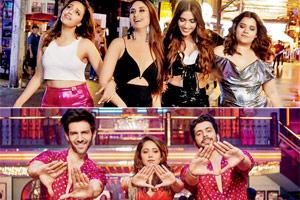Same or opposite gender, platonic co-habitation. In a word, flat-mate


Stills from Veere Di Wedding (top) and Sonu Ke Titu Ki Sweety
 In the opening scene of Veere Di Wedding, Kareena Kapoor sits on a pot, nervously scratching her neck in the loo, while her boyfriend, having just proposed to her, chats from outside the door.
In the opening scene of Veere Di Wedding, Kareena Kapoor sits on a pot, nervously scratching her neck in the loo, while her boyfriend, having just proposed to her, chats from outside the door.
ADVERTISEMENT
The two have been living in for a couple of years. And she feels marriage will change everything. What does marriage change, really? Wouldn't know. Having kids, it's easy to tell though, certainly makes your life (rightly) about someone else, too, and in its selflessness, transforms it. What's the difference between marriage (without children), and a relationship, then? That you can simply wake up and break-up in a relationship, I guess, while two families (sometimes rather large) divorce as a group, when a couple walks away in a marriage.
The strong exit barriers perhaps promises long-term companionship/security. You can't just throw it all away, because he can't sit through seven seasons of Game Of Thrones. Which explains the long-held tradition of getting the government and religion involved over an overblown, celebratory night as relatives and friends sing, drink, and dance to the fact that two consenting adults from hereon will be having sex only with each other (ideally), for the rest of their lives.
Of course, divorce doesn't excite a coalition of chattering aunts/cousins as much anymore. At least in the US, this began in the '60s/'70s, as Aziz Ansari's fine, funny bestseller Modern Romance points out, when women entered the labour force, established greater control over their bodies, and earned both economic independence, and the right to separate - leading to a massive spike in divorce rates.
The women simultaneously began to aspire, as Ansari argues, for passionate "soul-mate marriages" (finding the 'perfect person'), which is inevitably fraught with long-term disappointments, rather than a conventional "companionate marriage" - someone decent to start a family with that draws its own share of 'what ifs' at later age. Instead of being stuck with this, what if you could've been with someone who also loved GoT (or late-night drinking, or doing bhajans together, I don't know).
While an available option, the pain of divorce is obviously more tediously transactional - from a financial/legal point of view - besides merely emotional. Culturally, Europe appears to have almost given up on marriage as an institution altogether. Sonam Kapoor's character in Veere Di Wedding (about a bunch of female school-friends, who seem happiest when in the company of each other), is first appalled by, but agrees to a contractual pre-nuptial agreement, if she marries the man she's dating.
No, I'm not looking at the super-hit film Veere Di Wedding. That's what a review does. I'm looking at you (what this column tries to sometimes), even as the other full-on sex comedy this year, solely from the man's perspective, Sonu Ke Titu Ki Sweety, similarly turns out to be a sleeper blockbuster, with the guy Titu having to choose between his childhood best-friend Sonu, and Sweety, a perfectly fine woman he wants to wed.
What's the problem, again? Marriage. Or the extreme fear of a failed investment (of time, energy, emotions). What if it doesn't work out? As with any relationship, two people, while having been the closest ever, would simply turn into strangers. That buddy, on the other hand - especially that kid from kindergarten - is still around though.
Does this tally with what's outside the movie hall, as I survey a few dozen single men and women, in their early to late 30s, and even older, staying unmarried by choice, that for one, exists, and that they're completely proud of. Among couples, over half of those I'm close to, have decided not to have a child. In my dad's generation, the number for both unmarried at that age, or choosing to be childless, would approach a big fat zero.
Which already appears a few centuries away from the generation currently growing up with an infinite scroll on social media - each person a daily advertisement of goods and services - while one constantly walks along a series of swiping windows in the market-place of modern romance.
Does love become harder to find as sex becomes easier to get? Would the fear of getting "serious" rise, when being casual is a universally accepted option? Is self-love (and that narcissism could extend to obsession with professional goals as well) a genuine threat to relationships - good, or bad? Having considered all possibilities, and interviewed several drunken/sober respondents (without them quite knowing it), here's what I think might be the future of childless heterosexual relationships, if it isn't, in miniscule quarters, already: Mostly same (but sometimes opposite) gender, platonic, emotionally mild, financially neutral co-habitation. In one word: flat-mates.
What about sexual intimacy? They could be a series of 'serious flings', or 'friends with benefits'. What's 'friends with benefits', asks Gad Elmaleh in his Netflix stand-up special American Dream: "In France, we call them friends!" No, no. Not here. Or maybe that'll be the new complication!
Mayank Shekhar attempts to make sense of mass culture. He tweets @mayankw14 Send your feedback to mailbag@mid-day.com
Catch up on all the latest Mumbai news, crime news, current affairs, and also a complete guide on Mumbai from food to things to do and events across the city here. Also download the new mid-day Android and iOS apps to get latest updates
 Subscribe today by clicking the link and stay updated with the latest news!" Click here!
Subscribe today by clicking the link and stay updated with the latest news!" Click here!







